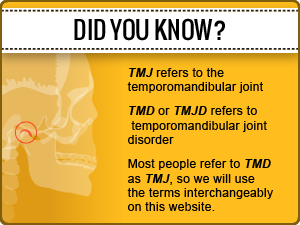Do You Think Your Headaches & Migraines Are Just From Stress? Think Again!
Do you experience chronic pain, especially headaches and migraines?
You may think, like most people, that the cause is simply from the stressors of daily life. After all, most of us are often under a tremendous amount of stress. It’s only logical to connect the two together.
What many people don’t realize, though, is that a serious underlying condition could be causing the pain. The condition is called TMJ disorder, or temporomandibular joint disorder.
We have many patients come into our office with chronic headaches and migraines. And we’ve been able to successfully treat them, reducing the frequency and intensity of pain they endure. We are able to do this by treating the cause: the jaw joint disorder.
What Is Temporomandibular Joint Disorder?
To understand this disorder, which you may be suffering from, we must first delve into what TMJ is in the first place.
There are two temporomandibular joints – one on each side of the head. This joint is where the upper and lower jaws hinge together. It’s what allows the mouth to open and close.
The bone of the lower jaw is rounded, and fits into a concavity in the upper jaw, like a ball and socket. Muscles and tendons hold the bones into place, while still allowing them to move around. In between the bones in the socket is a disc, a cushion of sorts to prevent the bones from rubbing together. This is similar to the discs of the spine – they cushion the vertebrae while allowing for fluid movement.
As you can imagine, when something is wrong with the jaw joints, more than the bones are involved. The muscles, nerves, and tendons of the face are all affected by the health of the jaw joint. So, too, are the teeth and the muscles of the head, neck, and shoulders.
There are several factors that contribute to TMJ disorders. Malocclusion is one – this is where the teeth aren’t aligned properly. The cause could be crowding or crooked teeth, or even jaw bones that didn’t form properly. When the jaws aren’t functioning optimally, the muscles are tensed and cause pain.
Another issue may be arthritis in the jaw joint. The arthritis can cause pain, stiffness, and even damage to the disc.
All of this contributes to inflammation, irritation, and pain. When the muscles of the face tense up, so do the muscles in the rest of the head, neck, and shoulders. The rest of the body tries to compensate for the weak area and, in turn, becomes weakened and painful itself.
3 Signs that You May be Dealing with this Painful Condition
How do you know if you’re dealing with TMJ headaches and migraines? Out TMJ disorder patients usually have the following symptoms.
1. You Don’t Just Have the Occasional Headache
TMJ disorder is a chronic condition, meaning that there will be chronic pain. Those dealing with TMJ disorder can have headaches and migraines multiple days during the week. They can even end up dealing with some sort of pain on a daily basis.
2. You Wake up in Pain
At night, many people clench and grind their teeth. This is hard on the jaw joint and muscles. Some people may wake up with a little bit of soreness. But those with TMJ disorder wake up with pain because they’ve exacerbated an already bad situation.
3. You Have Sensitive Teeth
Clenching and grinding, or irritated nerves from inflamed muscles can cause tooth sensitivity. Some patients have even come to us because they thought they had a tooth infection. The problem wasn’t the tooth, though, it was the jaw joint and muscles irritating the nerves of the teeth.
Why Suffer Any Longer? Contact Us for Relief from Your Headaches and Migraines
Chronic headaches and migraines can wreck havoc on a person’s life. Fortunately, there are remedies, as long as the person understands the underlying cause of their symptoms.
That’s where we come in. Whenever our patients come in for their new patient or annual examinations, we evaluate their TMJ. It is our mission to help our patients find relief. And with the latest dental appliances and procedures, chronic pain from TMJ disorder can be alleviated.
We hope you will contact us soon. When you visit us, we will do all we can to help you find relief. We look forward to being of service.
Are you ready to find relief from pain? Contact our office to find out more about our TMJ solutions and to schedule an appointment.

